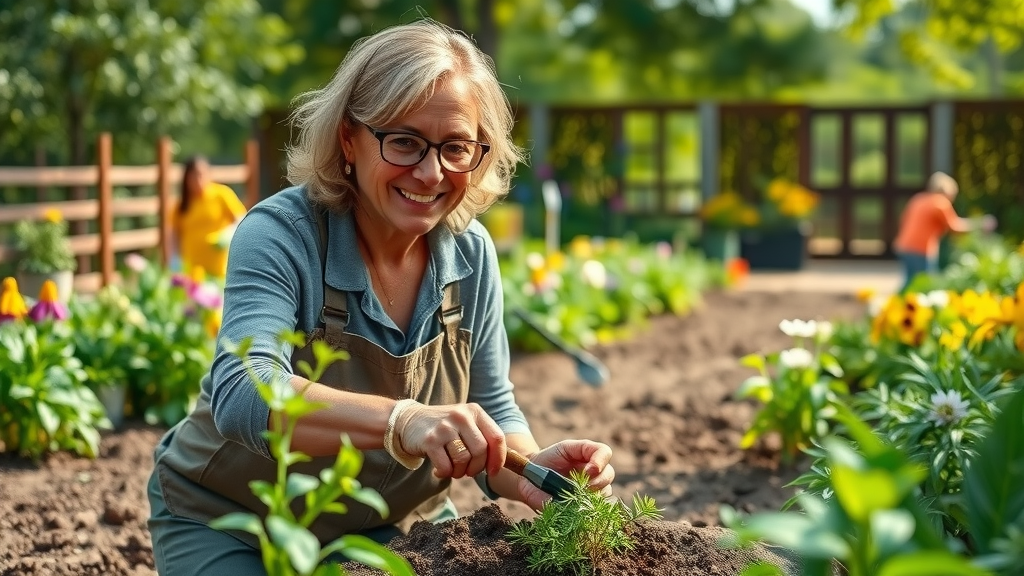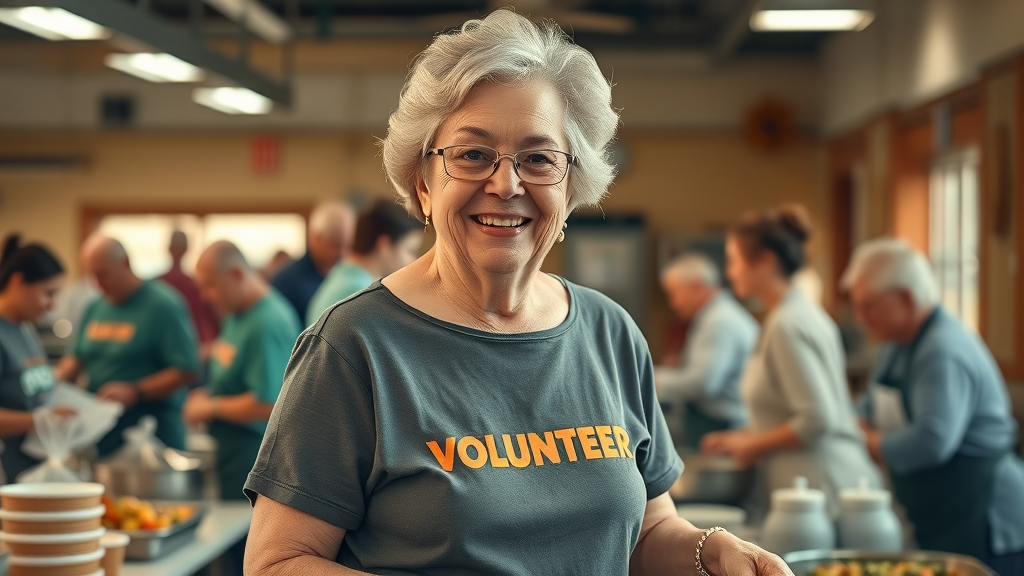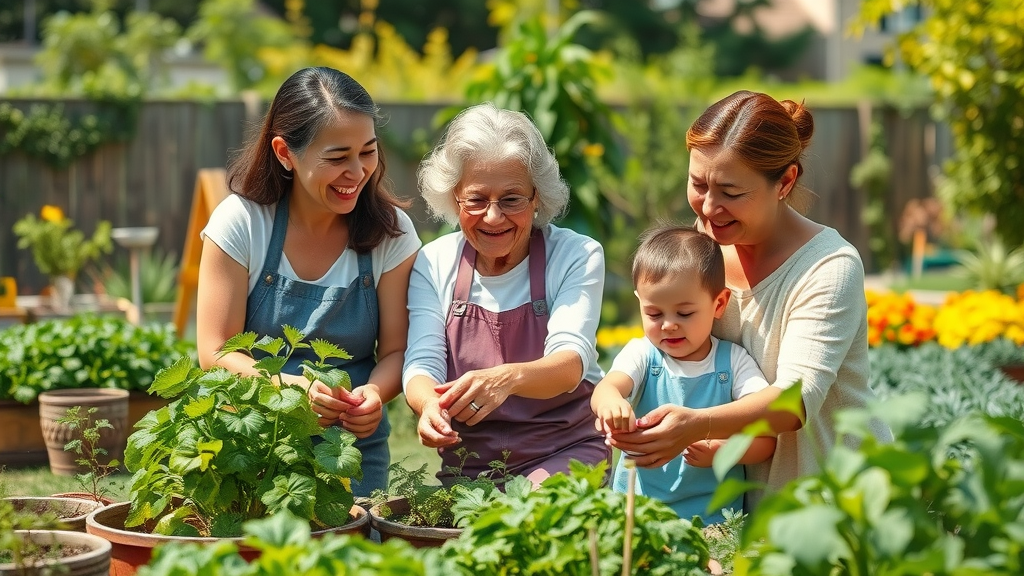Did you know that women who volunteer regularly are up to 20% more likely to report higher levels of life satisfaction and overall happiness than those who don’t? This intriguing link isn’t just a coincidence—it’s a testament to how giving back transforms physical health, mental wellness, and our sense of purpose. Dive in to see why supporting others might just be the secret to unlocking your own joy.
A Surprising Connection: Volunteering and Life Satisfaction Transform Women’s Happiness
When it comes to volunteering and life satisfaction, the impact is more profound than most expect. Studies reveal that women who take on volunteer roles enjoy not only enhanced emotional wellbeing but also measurable improvements in mental and physical health. The act of helping others fosters a sense of belonging, boosts self-worth, and creates supportive bonds—key ingredients for sustainable happiness. In our fast-paced world, where stress and isolation are increasingly common, volunteering offers a potent antidote for women seeking deeper joyfulness and connection.
Women in all stages of life—whether young professionals, midlife caregivers, or older adults—report a positive effect from community engagement. The benefits of volunteering extend well beyond fleeting good deeds. They catalyze higher levels of overall life satisfaction, foster lifelong friendships, and stimulate both mental and physical health. If you’ve ever wondered how to elevate your quality of life or support women’s wellness, exploring the synergy between volunteering and happiness is a powerful first step.
- What You'll Learn
- The significant relationships between volunteering and life satisfaction for women
- How quality of life is improved through community involvement
- The health benefits and outcomes experienced by female volunteers
- Practical tips to integrate volunteering into your wellness routine

Understanding Life Satisfaction: Foundations for Women’s Happiness
To fully appreciate how volunteering and life satisfaction intertwine, it helps to understand what “life satisfaction” really means, especially for women. It’s more than fleeting happiness; it’s a lasting sense of fulfillment driven by wellbeing across relationships, work, health, and personal growth. Diverse research—including work by Anderson et al and reviews found on Google Scholar—has shown that key elements such as purpose, social interaction, meaning, and autonomy contribute heavily to achieving greater life satisfaction.
Women in particular may experience life satisfaction in unique ways due to social roles, caregiving responsibilities, and community expectations. Having a robust support system, engaging in meaningful volunteer roles, and prioritizing wellness are all essential. As the current study into women’s wellness suggests, understanding the foundations of satisfaction empowers women to take charge of their happiness—often, by actively engaging in volunteering opportunities that boost both their own and their community’s wellbeing.
The Core Elements of Life Satisfaction
Life satisfaction is rooted in several intertwined factors—strong relationships, a sense of purpose, good physical health, and opportunities for self-advancement. For women, juggling multiple roles and responsibilities, balancing wellness with work or family commitments is no easy feat. However, integrating meaningful activities—such as volunteering—offers an accessible way to nurture these elements. When women choose volunteer roles that align with their values and passions, they’re more likely to see long-term gains in their mood, resilience, and quality of life.
Research highlights that women who feel engaged in their communities, have space for social connection, and contribute regularly to causes greater than themselves report higher levels of life satisfaction. Volunteering magnifies these outcomes by expanding social circles and affirming self-worth. By prioritizing personal wellbeing and community connection, women can set the stage for sustained joyfulness and true fulfillment.
Why Focus on Women’s Wellness and Joyfulness?
Why is it so important to view life satisfaction and wellness through a female lens? Women often provide both emotional and practical support in families and communities, roles that can either enrich or exhaust them without intentional self-care. When women focus on wellness and joyfulness, they become role models for holistic health, benefiting themselves and those around them. The benefits of volunteering become especially apparent in empowering women to break cycles of stress, find new meaning, and foster invaluable social networks.
Women’s lifelong responsibilities can sometimes feel overwhelming, but volunteering introduces a purposeful outlet for joy and fulfillment. As female volunteers participate in community activities, they tap into a wellspring of mutual support—lifting their own spirits while also uplifting others.
"True happiness lies in helping others. Women, in particular, have the power to transform their communities through volunteering." – Dr. Amelia Barnes, Wellness Advocate

The Link Between Volunteering and Life Satisfaction in Women
The relationship between volunteering and life satisfaction is especially profound among women. Multiple studies, including those by Willems et al and Anderson et al, have found that engaging in volunteer work acts as a catalyst for improved mental and physical health. This effect is often stronger in female volunteers due to their desire for deeper connections, impactful contributions, and personal growth. The quality of life scores for women who volunteer are consistently higher compared to those who don’t, underscoring the life-changing potential of even small acts of service.
Not only do volunteers reap health benefits, but they also enjoy enhanced self-esteem, social connectedness, and emotional resilience. In an age where women juggle evolving roles at home and work, volunteering presents a valuable pathway toward balancing self-fulfillment with community care. The dynamic interplay between helping others and achieving happiness is particularly evident in women who embrace volunteering as part of their wellness routine.
How Volunteering Enhances Overall Quality of Life
Volunteering offers an opportunity for women to step outside their everyday routines and pursue deeper engagement with the world around them. By taking on meaningful volunteer roles—such as mentoring, advocating for health, or organizing community cleanups—women can address community needs while simultaneously enriching their own quality of life. Notably, older adults who maintain active volunteering demonstrate greater life satisfaction, improved memory, and reduced risk of chronic disease, as reported in several health outcomes surveys.
Quality of life is not just a buzzword; it reflects overall wellbeing, encompassing physical, emotional, and social health. Women who volunteer regularly report a more robust sense of social identity and achievement. This positive effect translates into increased happiness, reduced feelings of isolation, and reinforced resilience against life’s challenges. By lending their time and talents, female volunteers are investing not only in their communities but in their own holistic wellness.
Health Benefits of Volunteering for Women
The health benefits of volunteering go far beyond simple goodwill—they’re scientifically proven to improve wellness on every level. Women who participate in volunteer activities frequently report fewer instances of heart disease, higher physical health scores, and even a lower risk of depression. Volunteering encourages greater physical activity, which in turn promotes healthy body weight, cardiovascular health, and longevity. Animal studies and clinical observations alike stress that staying active in service roles is especially beneficial for women as they age.
Furthermore, the mental health impact of volunteering cannot be overstated. By building social connections and a sense of purpose, women reduce their risk of anxiety and increase their overall levels of life satisfaction. Regular volunteering also provides structure and meaning, both fundamental for robust psychological health. The current study on women volunteers suggests that these health outcomes are not only sustainable but can amplify over time as engagement deepens.
Physical Health and Volunteering
Engaging in volunteer work provides women of all ages with opportunities to stay physically active, often in enjoyable and meaningful ways. From community gardening, hosting wellness walks, or participating in cleanup drives, these activities naturally increase movement and physical endurance. Numerous reports—such as those summarized on Google Scholar—highlight that female volunteers have higher physical health scores, better cardiovascular markers, and even reduced inflammation compared to non-volunteers. For older adults, regular volunteering helps maintain mobility and independence, warding off age-related decline.
Physical health improvements don’t stop at heart and muscle benefits. Volunteering is also linked to stronger immune responses, improved sleep patterns, and a greater willingness to maintain healthy habits, making it a crucial pillar for women’s wellness. The frequency of volunteering is positively correlated with resilience, vitality, and even longer life span—proving that giving back is one of the most rewarding forms of self-care.

Mental and Emotional Health Outcomes
While the physical health advantages are notable, the mental and emotional gains from volunteering may be even more profound. Women who prioritize community involvement often experience reduced symptoms of depression, less loneliness, and elevated mental wellness. The act of volunteering fosters a sense of belonging, shifts focus from stressors, and cultivates joy through meaningful acts, all contributing to greater life satisfaction.
Many female volunteers, including older volunteers, credit regular community service for helping them navigate major life transitions such as empty nesting or retirement. By feeling needed and appreciated, women find renewed purpose—an essential ingredient for sustainable happiness. Research indicates that these outcomes are amplified in group settings, where social interaction nurtures trust and emotional safety. Volunteering is more than a supplemental activity; it is an essential tool for protecting women’s mental health throughout life’s stages.
Personal Stories: Real Women, Real Happiness from Volunteering
The most compelling evidence for the benefits of volunteering and life satisfaction comes from the real lives of women who’ve chosen this path. Across communities, countless women—particularly older adults—report feeling reinvigorated, happier, and more connected because of volunteer work. Their journeys highlight how stepping into volunteer roles can ignite unforeseen passion, foster invaluable friendships, and create lifelong memories. These personal stories paint a vivid picture of wellbeing in action: where personal growth and community impact go hand in hand.
No two journeys are alike: Some women find joy in short-term projects, while others dedicate years to causes they hold close. What’s consistent, though, is the positive effect volunteering has on their outlook, energy, and zest for life. By sharing their victories and challenges, these women inspire others to explore giving back as a powerful wellness strategy—regardless of life stage, background, or previous experience.
Case Study: Older Volunteers Find Renewed Purpose
Meet Mary, an older volunteer who discovered a new lease on life after retirement: “Giving my time to others has filled life with unexpected joy.” Like Mary, many older adults encounter loneliness or a loss of social identity as careers wind down. Volunteering provides them with structure, continuous learning, and friendships that buffer against these transitions. Data consistently shows that older volunteers possess higher quality of life and greater life satisfaction when compared to peers who do not participate in similar roles.
"Giving my time to others has filled life with unexpected joy." – Mary, Community Volunteer, Age 62
Mary’s experience is backed by studies where volunteers reported lower rates of chronic illness and higher self-esteem, tying their sense of purpose directly to community service. As women age, their physical and mental health can be vastly improved by remaining active in volunteer circles. In this way, volunteering acts as both a social support and a source of meaning, with each small act cumulatively building toward greater life satisfaction.

Quality of Life: Volunteering as a Wellness Strategy for Women
Integrating volunteering and life satisfaction into a holistic wellness plan is one of the most powerful actions women can take. As women’s lives shift through various phases—whether focused on career, parenting, or active aging—having a wellness strategy that incorporates community engagement enhances both their personal and societal impact. Volunteering offers regular opportunities for growth, motivation, and purposefulness, developing skills that go far beyond the role itself.
Women who embrace volunteering as a wellness strategy report that it increases their self-efficacy, sense of agency, and long-term wellbeing. These benefits ripple outward, inspiring other women to join, creating stronger communities, and fostering a positive culture of mutual support. Whether a woman mentors youth, aids local shelters, or leads environmental initiatives, each act serves as a building block for enhanced quality of life and lasting joyfulness.
How Volunteering Improves Social Connections
Central to the benefits of volunteering is the sense of community and social connection it fosters. Women who volunteer regularly are more likely to build lasting friendships, expand their professional networks, and nurture a deep sense of belonging. These social ties are critical for emotional health, reducing feelings of isolation and promoting resilience against stress. A robust support system often emerges from volunteer circles, enriching life both inside and outside of service activities.
Engaging in group volunteer activities, such as wellness workshops, cleanups, or advocacy campaigns, enables women to connect with people who share common values and interests. These connections enhance mental health and serve as a foundation for higher levels of life satisfaction, reinforcing the idea that volunteering is a dual investment in oneself and the broader community.

Volunteering Activities That Boost Life Satisfaction
Choosing the right volunteer activity is key to achieving the full spectrum of volunteering’s rewards. Women can benefit from exploring options that best match their skills, passions, and schedules. The following are among the most popular and effective volunteering activities for improving life satisfaction and wellness:
- Mentoring young girls
- Organizing wellness workshops
- Environmental cleanup drives
- Supporting local shelters
- Advocating for mental health
Each of these volunteer roles challenges women to develop new skills, step out of their comfort zones, and create lasting impact. The pathway to greater life satisfaction often begins with one small commitment—then grows as confidence and motivation increase. For women looking to boost joyfulness and personal growth, even one or two hours per month can be transformative.

| Health Outcomes | Volunteers | Non-Volunteers |
|---|---|---|
| Physical Health Scores | High | Moderate |
| Mental Wellness | High | Low |
| Quality of Life Index | High | Moderate |
Women, Wellness, and the Ripple Effects of Volunteering
The influence of volunteering among women goes much further than personal gain—it has a ripple effect, shaping stronger families, communities, and even future generations. As women invest time and energy in causes they care about, they become catalysts for positive change. Their enhanced life satisfaction doesn’t just stop with them: it spreads to those they mentor, support, and inspire, fostering cycles of wellness that uplift entire networks.
What makes this effect especially powerful is how it multiplies over time. When women model joyfulness, wellness, and resilience, they encourage others to follow suit. In schools, workplaces, and neighborhoods, empowered women volunteers ignite enthusiasm, compassion, and innovation—strengthening collective wellbeing and opportunity for all.
Why Life Satisfaction Grows When Women Support Their Communities
When women volunteer, their sense of purpose aligns with broader community goals, amplifying both personal and collective quality of life. Taking on meaningful volunteer activities fosters pride, ownership, and a deeper connection to local needs and triumphs. For many women, the act of giving back is directly linked not only to happiness, but also to identity and self-actualization. As women’s confidence and satisfaction grow, so does the vibrancy of their communities.
This dynamic is particularly evident in multi-generational environments—when young women see positive female role models investing in volunteer work, they are more likely to develop into confident, community-minded adults themselves. In this way, the woman-wellness-volunteering link is an engine for endless cycles of growth and joyfulness.

Intergenerational Health Benefits: How Female Volunteers Shape the Next Generation
Female volunteers have an outsized influence on the well-being of younger and older generations alike. By gardening with children, mentoring teens, or collaborating with elders, women nurture a culture of compassion and mutual support. These intergenerational connections offer unique mental and physical health benefits, including reduced stress and improved communication skills, while teaching future generations the power of altruism and resilience.
As mothers, grandmothers, and community leaders, women set examples of well-rounded living. These shared activities create bridges between age groups, encouraging family involvement and collective wellness. Researchers—including those referenced via Google Scholar—have highlighted that such intergenerational volunteer efforts are crucial for stronger, more inclusive communities, ensuring that the joy and health benefits of volunteering pass seamlessly from one generation to the next.

Barriers and Challenges for Women in Volunteering
Despite the extensive benefits of volunteering, many women encounter substantial barriers that can limit their involvement. Chief among these obstacles are time constraints, family obligations, workplace demands, and cultural expectations. Juggling multiple roles without adequate support can make prioritizing volunteer activities challenging. Women often report feeling guilty or overwhelmed at the thought of adding anything else to their crowded routines, even if the rewards are significant.
These obstacles highlight the importance of building realistic, flexible pathways for women to engage in volunteer roles. By acknowledging and addressing these barriers, communities and organizations can empower more women to access the full spectrum of life satisfaction and joyfulness that volunteering can offer.
Time Constraints and Family Responsibilities
For many women, the largest hurdle to volunteering is simply finding the time. Balancing work, home, and family life requires both planning and creativity. Mothers and professionals, in particular, struggle to carve out space for meaningful engagement outside their immediate circles. However, studies show that even modest contributions—a few hours monthly—provide tangible health outcomes and greater life satisfaction. Sharing responsibilities with partners, asking for community support, and setting manageable goals can help women overcome time barriers.
Organizations can also play a vital role by offering flexible scheduling, virtual volunteering opportunities, and family-inclusive activities. Adaptability is key—ensuring women at all stages of life can contribute in ways that suit their unique situations. By recognizing these realities, we can make volunteering more accessible, rewarding, and sustainable for every woman.

Overcoming Social and Cultural Obstacles
Social and cultural expectations can also deter women from fully embracing volunteer opportunities. In some communities, volunteering may not be prioritized or may be viewed as secondary to work or family obligations. For others, a lack of representation or support networks can leave women feeling out of place or undervalued. Overcoming these obstacles requires collective effort—from community organizations to family members—to highlight the importance of female-led initiatives and create inclusive, welcoming volunteer spaces.
Women who succeed in carving out time for community service often report newfound confidence, broader networks, and a greater sense of autonomy as a result. Hearing and sharing stories—like those of successful female volunteers—helps to break stereotypes and encourage more women to invest in their own happiness and quality of life through purposeful giving.
"Finding time for volunteering is tough, but the happiness it brings is worth every effort." – Sheila, Working Mother
Practical Steps to Incorporate Volunteering into Women’s Wellness Routines
Making volunteering a habit doesn’t have to be overwhelming. By starting with small, intentional changes, women can seamlessly integrate service into their wellness routines. Here’s a simple step-by-step guide to get started:
- Identify Causes You Care About: Reflect on which issues align with your values and passions for sustained engagement.
- Research Local Opportunities Focused on Women: Seek out organizations or community groups where your skills and interests will make the greatest impact.
- Start Small: Commit to Monthly Activities: Begin with manageable commitments and build up as you become more comfortable and confident.
- Build a Support Network with Other Female Volunteers: Collaborate with like-minded women for motivation, accountability, and friendship.
- Track Personal Growth and Satisfaction: Regularly assess how volunteering is influencing your happiness, wellbeing, and sense of purpose.
These practical steps help minimize overwhelm and ensure that volunteering enhances, rather than complicates, your path to wellness. Every woman’s journey is unique—and so are the ways she can impact her community and improve her life satisfaction.

Frequently Asked Questions: Volunteering and Life Satisfaction for Women
Why is volunteering so satisfying?
Volunteering is satisfying because it provides a sense of purpose, strengthens social connections, and gives women the chance to see real-world impact from their efforts. These experiences activate positive emotions, reduce feelings of stress, and bolster both self-worth and community bonds. Studies show that women who volunteer regularly enjoy higher levels of life satisfaction, better mental health, and a more robust support system, making even short volunteer engagements deeply rewarding.
What are 5 benefits of volunteering?
The benefits of volunteering for women are wide-ranging:
- Improved physical health through increased activity and healthier habits
- Enhanced mental wellness and reduced risk of depression and anxiety
- Greater life satisfaction and meaning
- Expanded social connections and support networks
- New skills and increased self-confidence that extend to other life areas
What are the three R's for volunteering?
The three R’s for volunteering are Readiness (being prepared to engage), Respect (valuing all participants and cultures), and Responsibility (fulfilling your commitments and representing your cause with integrity). Embracing these principles ensures meaningful, positive experiences that contribute to both individual and community wellness and life satisfaction.
What is the relationship between volunteering and happiness?
The relationship between volunteering and happiness is powerful and well-documented. Women who regularly participate in service activities enjoy higher levels of life satisfaction, improved physical and mental health, and a greater sense of meaning and accomplishment. These factors combine to create sustainable happiness—turning acts of service into lifelong sources of joy and personal fulfillment.
Key Takeaways: How Volunteering and Life Satisfaction Drive Wellness in Women
- Volunteering boosts both physical and mental health benefits for women
- Enhances overall quality of life, life satisfaction, and joyfulness
- Social connections foster personal growth and community impact
- Real-life examples highlight authentic wellness journeys
Final Thoughts: Elevate Your Life With Volunteering and Life Satisfaction
Women hold the keys to their own joyfulness—by embracing volunteering, they amplify life satisfaction, wellness, and positive change for themselves and everyone around them.
Ready to Thrive? Subscribe for More Women’s Wellness and Success Tips
For more strategies on how to be a successful woman in every area of your life, subscribe here.
 Add Row
Add Row  Add
Add 




Write A Comment